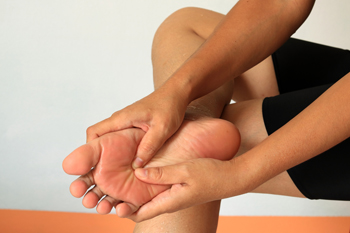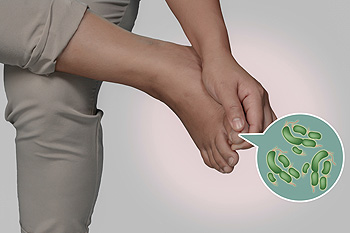Manalapan
(732) 845-0100
Manalapan (732) 845-0100
 Diabetic patients can be more prone to experiencing complications with their feet. One of these complications can include a condition known as neuropathy. Neuropathy is often linked with nerve damage, which can cause a loss of feeling in the lower extremities. This can be incredibly dangerous for diabetic patients in particular, because they may be more likely to develop infections. If a diabetic patient develops a wound, however it goes unnoticed because of the neuropathy, they may be at risk of getting a foot ulcer. An ulcer is a slow healing, deep open wound that requires immediate attention. If you have diabetes, it is strongly suggested you are under the care of a podiatrist, especially if you have neuropathy.
Diabetic patients can be more prone to experiencing complications with their feet. One of these complications can include a condition known as neuropathy. Neuropathy is often linked with nerve damage, which can cause a loss of feeling in the lower extremities. This can be incredibly dangerous for diabetic patients in particular, because they may be more likely to develop infections. If a diabetic patient develops a wound, however it goes unnoticed because of the neuropathy, they may be at risk of getting a foot ulcer. An ulcer is a slow healing, deep open wound that requires immediate attention. If you have diabetes, it is strongly suggested you are under the care of a podiatrist, especially if you have neuropathy.
Neuropathy
Neuropathy can be a potentially serious condition, especially if it is left undiagnosed. If you have any concerns that you may be experiencing nerve loss in your feet, consult with Dr. Charles Marchese from Manalapan Foot & Ankle. Our doctor will assess your condition and provide you with quality foot and ankle treatment for neuropathy.
What Is Neuropathy?
Neuropathy is a condition that leads to damage to the nerves in the body. Peripheral neuropathy, or neuropathy that affects your peripheral nervous system, usually occurs in the feet. Neuropathy can be triggered by a number of different causes. Such causes include diabetes, infections, cancers, disorders, and toxic substances.
Symptoms of Neuropathy Include:
Those with diabetes are at serious risk due to being unable to feel an ulcer on their feet. Diabetics usually also suffer from poor blood circulation. This can lead to the wound not healing, infections occurring, and the limb may have to be amputated.
Treatment
To treat neuropathy in the foot, podiatrists will first diagnose the cause of the neuropathy. Figuring out the underlying cause of the neuropathy will allow the podiatrist to prescribe the best treatment, whether it be caused by diabetes, toxic substance exposure, infection, etc. If the nerve has not died, then it’s possible that sensation may be able to return to the foot.
Pain medication may be issued for pain. Electrical nerve stimulation can be used to stimulate nerves. If the neuropathy is caused from pressure on the nerves, then surgery may be necessary.
If you have any questions, please feel free to contact our offices located in Manalapan, NJ, and Staten Island, NY . We offer the newest diagnostic and treatment technologies for all your foot care needs.
 Falls are the number one cause of injury and hospital visits due to trauma for people ages 65 and older. Various factors can increase one’s risk of falling including past falls, tripping, and falling hazards in the home and community, chronic diseases, taking multiple medications, having poor vision, balance problems, memory problems, depression, and behaviors like rushing. Problems with the feet and ankles, such as difficulty walking, weakness, or loss of sensation in the lower limbs, and wearing improper footwear can all increase the risk of falling as well. If you have foot or ankle issues, it is important to seek medical care from a podiatrist, who can diagnose and treat your condition and reduce your risk of falling.
Falls are the number one cause of injury and hospital visits due to trauma for people ages 65 and older. Various factors can increase one’s risk of falling including past falls, tripping, and falling hazards in the home and community, chronic diseases, taking multiple medications, having poor vision, balance problems, memory problems, depression, and behaviors like rushing. Problems with the feet and ankles, such as difficulty walking, weakness, or loss of sensation in the lower limbs, and wearing improper footwear can all increase the risk of falling as well. If you have foot or ankle issues, it is important to seek medical care from a podiatrist, who can diagnose and treat your condition and reduce your risk of falling.
Preventing falls among the elderly is very important. If you are older and have fallen or fear that you are prone to falling, consult with Dr. Charles Marchese from Manalapan Foot & Ankle. Our doctor will assess your condition and provide you with quality advice and care.
Every 11 seconds, an elderly American is being treated in an emergency room for a fall related injury. Falls are the leading cause of head and hip injuries for those 65 and older. Due to decreases in strength, balance, senses, and lack of awareness, elderly persons are very susceptible to falling. Thankfully, there are a number of things older persons can do to prevent falls.
How to Prevent Falls
Some effective methods that older persons can do to prevent falls include:
Falling can be a traumatic and embarrassing experience for elderly persons; this can make them less willing to leave the house, and less willing to talk to someone about their fears of falling. Doing such things, however, will increase the likelihood of tripping or losing one’s balance. Knowing the causes of falling and how to prevent them is the best way to mitigate the risk of serious injury.
If you have any questions, please feel free to contact our offices located in Manalapan, NJ, and Staten Island, NY . We offer the newest diagnostic and treatment technologies for all your foot care needs.
 Are your toenails thick, crumbling, or yellow? Do you find yourself avoiding certain activities and open-toed shoes for fear of someone seeing your nails? If so, you may be suffering from onychomycosis, or a fungal nail infection. Though it can be an embarrassing problem, you are definitely not the only one facing it. Approximately 10% of the general population is afflicted by a fungal nail infection. Beyond just their appearance, these infections can also cause toe and foot pain, lead to bacterial infections and ulcerations, and can even cause complications in people with diabetes. Topical or oral medications may help, though they are not always effective, and have the potential to lead to serious side effects. Laser treatment is another option that may be effective. If you have developed a toenail fungus, don’t hesitate to talk to a podiatrist who can help you select the treatment option that is best for you.
Are your toenails thick, crumbling, or yellow? Do you find yourself avoiding certain activities and open-toed shoes for fear of someone seeing your nails? If so, you may be suffering from onychomycosis, or a fungal nail infection. Though it can be an embarrassing problem, you are definitely not the only one facing it. Approximately 10% of the general population is afflicted by a fungal nail infection. Beyond just their appearance, these infections can also cause toe and foot pain, lead to bacterial infections and ulcerations, and can even cause complications in people with diabetes. Topical or oral medications may help, though they are not always effective, and have the potential to lead to serious side effects. Laser treatment is another option that may be effective. If you have developed a toenail fungus, don’t hesitate to talk to a podiatrist who can help you select the treatment option that is best for you.
If left untreated, toenail fungus may spread to other toenails, skin, or even fingernails. If you suspect you have toenail fungus it is important to seek treatment right away. For more information about treatment, contact Dr. Charles Marchese of Manalapan Foot & Ankle. Our doctor can provide the care you need to keep you pain-free and on your feet.
Symptoms
Treatment
If self-care strategies and over-the-counter medications does not help your fungus, your podiatrist may give you a prescription drug instead. Even if you find relief from your toenail fungus symptoms, you may experience a repeat infection in the future.
Prevention
In order to prevent getting toenail fungus in the future, you should always make sure to wash your feet with soap and water. After washing, it is important to dry your feet thoroughly especially in between the toes. When trimming your toenails, be sure to trim straight across instead of in a rounded shape. It is crucial not to cover up discolored nails with nail polish because that will prevent your nail from being able to “breathe”.
In some cases, surgical procedure may be needed to remove the toenail fungus. Consult with your podiatrist about the best treatment options for your case of toenail fungus.
If you have any questions, please feel free to contact our offices located in Manalapan, NJ, and Staten Island, NY . We offer the newest diagnostic and treatment technologies for all your foot care needs.
 Running is great exercise, but if you are not wearing the right shoes, you may be putting yourself at risk for injuries and pain. Before you run, make sure that you are wearing properly-fitted running shoes specifically designed for this sport. The exact type of running shoes that you buy can depend on several factors. Consider where you are planning to run, and choose shoes that work well on that surface. It is also important to determine the amount of cushioning that you would like under your foot and to know whether or not you need a specific type of shoe to support your gait. For more information on how to pick the best running shoes for you, consult with a podiatrist today.
Running is great exercise, but if you are not wearing the right shoes, you may be putting yourself at risk for injuries and pain. Before you run, make sure that you are wearing properly-fitted running shoes specifically designed for this sport. The exact type of running shoes that you buy can depend on several factors. Consider where you are planning to run, and choose shoes that work well on that surface. It is also important to determine the amount of cushioning that you would like under your foot and to know whether or not you need a specific type of shoe to support your gait. For more information on how to pick the best running shoes for you, consult with a podiatrist today.
If you are a runner, wearing the right running shoe is essential. For more information, contact Dr. Charles Marchese from Manalapan Foot & Ankle. Our doctor can provide the care you need to keep you pain-free and on your feet.
Choosing the Right Running Shoe for Your Foot Type
To increase performance and avoid the risk of injury, it is important to choose the right running shoe based on your foot type. The general design of running shoes revolves around pronation, which is how the ankle rolls from outside to inside when the foot strikes the ground.
If you have any questions please feel free to contact our offices located in Manalapan, NJ, and Staten Island, NY . We offer the newest diagnostic and treatment technologies for all your foot and ankle needs.
 The medical condition that is known as gout can cause severe pain and difficulty walking. It generally affects the joints in the big toe, and may cause swelling and redness. It can develop as a result of excess uric acid in the bloodstream, which can occur for various reasons. These can include genetic factors, or from eating foods that have high levels of purines. Elevated levels of purines can be found in specific foods such as red meat, shellfish, and drinks that are made with large amounts of sugar. To determine the severity of gout, fluid is removed from the affected joints and observed for uric acid crystals. It is strongly recommended that a podiatrist be consulted if you are afflicted with gout.
The medical condition that is known as gout can cause severe pain and difficulty walking. It generally affects the joints in the big toe, and may cause swelling and redness. It can develop as a result of excess uric acid in the bloodstream, which can occur for various reasons. These can include genetic factors, or from eating foods that have high levels of purines. Elevated levels of purines can be found in specific foods such as red meat, shellfish, and drinks that are made with large amounts of sugar. To determine the severity of gout, fluid is removed from the affected joints and observed for uric acid crystals. It is strongly recommended that a podiatrist be consulted if you are afflicted with gout.
Gout is a painful condition that can be treated. If you are seeking treatment, contact Dr. Charles Marchese from Manalapan Foot & Ankle. Our doctor will treat your foot and ankle needs.
What Is Gout?
Gout is a form of arthritis that is characterized by sudden, severe attacks of pain, redness, and tenderness in the joints. The condition usually affects the joint at the base of the big toe. A gout attack can occur at any random time, such as the middle of the night while you are asleep.
Symptoms
Risk Factors
Prior to visiting your podiatrist to receive treatment for gout, there are a few things you should do beforehand. If you have gout you should write down your symptoms--including when they started and how often you experience them, important medical information you may have, and any questions you may have. Writing down these three things will help your podiatrist in assessing your specific situation so that he or she may provide the best route of treatment for you.
If you have any questions, please feel free to contact our offices located in Manalapan, NJ, and Staten Island, NY . We offer the newest diagnostic and treatment technologies for all your foot care needs.